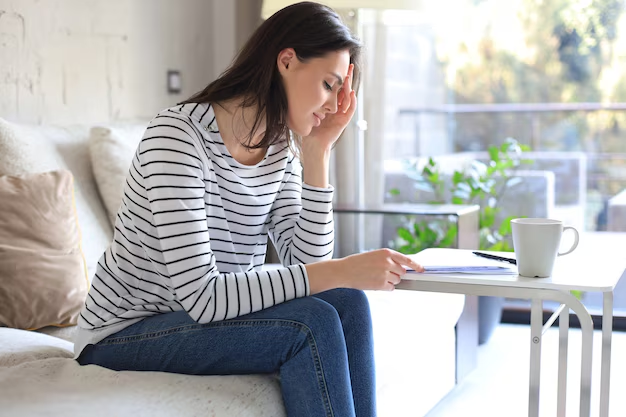Navigating the Connection: How Anxiety Might Be Draining Your Energy
Imagine waking up each morning feeling as if you've run a marathon, despite having just spent hours in bed. If you’ve ever experienced anxiety, this scenario may sound familiar. While many people associate anxiety with a rapid heartbeat or racing thoughts, fatigue is a frequently overlooked symptom. But does anxiety really cause fatigue? Let's delve deep into the intricate relationship between anxiety and that persistently elusive energy.
Understanding Anxiety: More than Just Worry
Anxiety is more than fleeting worry or nervousness. It is a complex emotion characterized by feelings of tension, worried thoughts, and physical changes. While momentary anxiety can be a normal reaction to stress, chronic anxiety can interfere with daily activities and well-being.
The Physical Toll of Anxiety
Anxiety triggers a fight or flight response within the body—a protective mechanism dating back to our early ancestors. While this response was invaluable for survival in the times of physical threats, today's stressors, like work deadlines or social interactions, elicit the same response, though often unnecessarily. Let's explore how the physical manifestations of anxiety can contribute to fatigue.
- Adrenaline Rush: Anxiety causes a spike in adrenaline, a hormone that prepares the body to react quickly. When this heightened alert state persists, it leads to physical exhaustion.
- Muscle Tension: Persistent anxiety often results in ongoing muscle tension, leading to feelings of tiredness and bodily discomfort.
- Heart and Respiration: Anxiety increases heart rate and breathing, demanding more energy from the body.
Mental Exhaustion
Chronic anxiety isn't only a physical drain but also a mental one. Here's how:
- Cognitive Load: Constantly overanalyzing or worrying about potential outcomes can lead to mental exhaustion.
- Sleep Disturbances: Anxiety often leads to insomnia or restless sleep, contributing directly to fatigue.
- Decision Fatigue: The continuous need to make decisions in an anxious state wears down mental energy over time.
The Cycle of Anxiety and Fatigue
One of the most frustrating aspects of dealing with anxiety and fatigue is their cyclical nature. Persistent fatigue can lead to increased anxiety as tasks and responsibilities pile up, further fueling exhaustion. Similarly, anxiety exacerbates fatigue by interfering with rest and demanding energy surges. When unmanaged, this loop can become seemingly endless.
Identifying Anxiety-Induced Fatigue
It's essential to pinpoint whether anxiety is the underlying cause of your fatigue. While each individual is different, here are a few indicators:
- Persistent Tiredness: Feeling exhausted despite sufficient sleep might suggest anxiety-related fatigue.
- Sleep Quality: Frequent awakenings or trouble staying asleep can indicate anxiety-induced disturbances.
- Difficulty Concentrating: Foggy thinking or trouble focusing often accompanies anxiety and fatigue.
- Physical Symptoms: Headaches, stomachaches, or muscle pain appearing alongside anxiety can exacerbate tiredness.
Exploring Other Fatigue Causes
While anxiety might be a culprit, other conditions can also cause fatigue. It's vital to consider other potential factors:
- Diet and Nutrition: Lacking essential vitamins or not eating balanced meals can sap your energy.
- Physical Health Issues: Conditions such as anemia, thyroid disease, or chronic fatigue syndrome could be at play.
- Lifestyle Issues: Poor sleep hygiene, excessive caffeine, or lack of physical activity can contribute to feeling tired.
Practical Steps to Break the Cycle
Although addressing anxiety-induced fatigue involves persistence, several practical strategies can help mitigate its effects:
Prioritizing Sleep Hygiene
- Consistent Schedule: Going to bed and waking up at the same time daily helps regulate your body's internal clock.
- Relaxation Routine: Incorporating calming activities such as reading, meditation, or warm baths before bed can reduce anxiety.
- Screen Time Limitation: Avoiding screens before bedtime enhances sleep quality, as blue light can interfere with melatonin production.
Cognitive Strategies
- Mindfulness and Meditation: These practices help ground your thoughts, reducing anxiety and conserving mental energy.
- Journaling: Writing down worries before bed helps clear your mind and can offer a psychological release.
- Challenge Negative Thoughts: Identifying and reframing anxiety-provoking thoughts reduces mental stress.
Physical Activity and Nutrition
- Regular Exercise: Physical activity reduces anxiety levels and improves sleep, directly combating fatigue.
- Balanced Diet: Consuming a well-rounded diet rich in nutrients supports energy levels and mental health.
- Hydration: Dehydration can worsen fatigue, so ensure regular water intake.
Seeking Professional Guidance
While lifestyle changes are a great start, professional help may be necessary if anxiety-induced fatigue persists:
- Therapy: Cognitive-behavioral therapy (CBT) effectively treats anxiety and can address underlying sources of fatigue.
- Support Groups: Sharing experiences in a group provides community understanding and accountability.
- Medical Consultation: A health professional can rule out other conditions and create a tailored plan for managing symptoms.
Embracing Holistic Wellness
Addressing anxiety-induced fatigue is about understanding the intricate balance between body and mind. By recognizing anxiety's physical and mental demands and engaging in practical, daily efforts, you can start restoring energy levels and improve overall well-being. Empower yourself with the knowledge and strategies needed to thrive, even when anxiety tries to weigh you down.
Quick Recap: Keeping Your Energy Up While Managing Anxiety 💪
- Understand the cycle: Recognizing the interrelation between anxiety and fatigue is crucial.
- Sleep smart: Develop a consistent sleep routine.
- Mindfulness matters: Incorporate relaxation techniques like meditation and journaling.
- Stay active: Regular physical activity helps manage anxiety and increases energy levels.
- Eat right: Prioritize a balanced diet to fuel your body effectively.
- Stay hydrated: Prevent fatigue by drinking enough water.
- Seek support: Don’t hesitate to reach out to professionals or support groups for help.
By taking proactive steps and understanding the nuances of anxiety and fatigue, you can pave the way toward a more energized and balanced life, despite the challenges that lie in the path. 🌟

